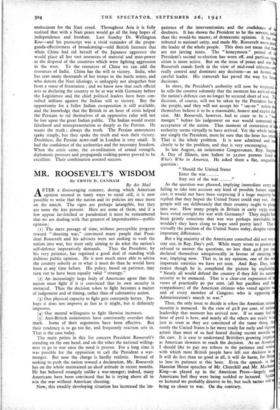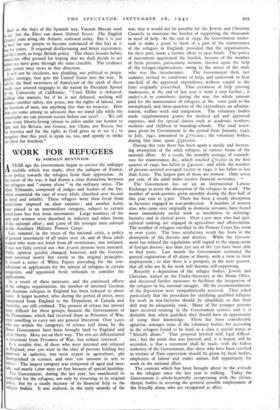MR. ROOSEVELT'S WISDOM
By ERWIN D. CANHAM By Air Mail AFTER a discouraging summer, during which American opinion seemed in many ways to stand still, it is now possible to write that the nation and its policies are once more on the march. The signs are perhaps intangible, but they are none the less present. Here are some of them, and if a few appear far-fetched or paradoxical it must be remembered that we are dealing with that greatest of imponderables—public opinion: (r) The mere passage of time, without perceptible progress toward " shooting war," convinced many people that Presi- dent Roosevelt and his advisers were not seeking to rush the nation into war, but were only aiming to do what the nation's self-defence imperatively demands. Thus the President, by his very patience, has regained a good deal of standing with dubious public opinion. He is now much more able to advise the country soberly as to what it must do than he would have been at any time before. His policy, based on patience, may turn out to have been equally valid " strategy."
(2) An increasingly large body of Americans agree that the nation must fight if it is convinced that its own security is menaced. Thus the decision when to fight becomes a matter of judgement and of timing, rather than of substantive action.
(3) Our physical capacity to fight gets constantly better. Per- haps it does not improve as fast as it might, but it definitely improves.
(4) Our mental willingness to fight likewise increases.
(5) Anti-British isolationists have consistently overshot their mark. Some of their arguments have been effective. But their tendency is to go too far, and frequently reaction sets in. That is the case today.
The main points in this list concern President Roosevelt's standing on the one hand, and on the other the national willing- ness to go to war once the need is proven. For a long time it was possible for the opposition to call the President a war- monger. But now the charge is hardly realistic. Instead of seeking to push the nation toward a declaration, Mr. Roosevelt has on the whole maintained an aloof attitude in recent months. He has behaved strangely unlike a war-monger; indeed, many Americans have been convinced that he is trying above all to win the war without American shooting.
Now, this steadily developing situation has increased the im- patience of the interventionists and the confidence of doubters. It has shown the President to be the servant, than the would-be master, of democratic opinion. It has tributed to national unity, and made Mr. Roosevelt more the leader of the whole people. This does not mean that are not jarring notes. The " honeymoon " period of President's second re-election has worn off, and partisan op sition is more active. But on the issue of peace and war Roosevelt stands forth in the view of mid-road citizens really control and dominate any decision—as an honest careful leader. His statecraft has paved the way for fu decisions.
In short, the President's authority will now be respected he tells the country solemnly that the moment has arrived w the nation's defence can no longer be secured short of war. decision, of course, will not be taken by the President but the people, and they will not accept his " say-so " unless themselves believe it to be a reasonable, honest and expert d sion. Mr. Roosevelt, however, had to cease to be a "w monger " before his judgement on war would command acceptance of the nation. That moment of restoration of authority seems virtually to have arrived. Yet the whole na not simply the President, must be sure that the hour has stru That is the whole problem. It is now admitted and clearly to be the problem, and that is very encouraging.
In late August, an isolationist Congressman, Rep. Step A. Day of Illinois, sent ballots to 32,000 persons listed Who's Who in America. He asked them a fiat, unqualifi question: " Should the United- States Enter the war Stay out of the war As the question was phrased, implying immediate entry failing to take into account any kind of possible future tug cies, it would not have been surprising if a huge majority replied that they hoped the United States could stay out. F people will say deliberately that their country ought to pl into war. How many people in Britain in early 1939 wo have voted outright for war with Germany? They might ha been grimly conscious that war was perhaps inevitable, b wouldn't they have clung to hope until pretty late? That virtually the position of the United States today, despite van important differences.
But a big majority of the Americans consulted did not vote stay out, in Rep. Day's poll. While many wrote to protest refused to answer the questions, no less than 42.8 per declared themselves unequivocally in favour of entering war, implying now. That is, in my opinion, one of the important statistics we have yet seen. And Rep. Day, iso tionist though he is, completed the picture by explaining " Nearly all would defend the country if they felt its natio security to be menaced. That is a clear-cut expression of views of practically 90 per cent. (all but pacifists and A sympathisers) of the American citizens who voted against to and of every member of Congress who is opposing tit Administration's march to war."
Thus, the only issue to decide is when the American natio security is menaced. In the view of 4233 per cent. of natio leadership that moment has arrived now. If so many feel hour of peril is here, and nearly all the others are ready to a just as soon as they are convinced of the same thing, surely the United States is far more ready for early and vigo action than most of us had feared during recent months the case. It is easy to understand Britishers growing impan at American slowness to reach the decision. As an Amen I should like to pay my tribute to the patience and wiscl with which most British people have left our decision to It will do less than no good at all, it will do harm, for Bn to lose its patience at this hour. Even the appeals in Mansion House speeches of Mr. Churchill and Mr. Mack King—as played up in the American Press—hugely Americans feel they were being scolded or lectured. Sco or lectured we probably deserve to be, but such tactics Will II bring us closer to war. On the contrary. •
!I
Back in the days of the Spanish war, Vincent Sheean used to say that the Ebro ran down Oxford Street. The English Channel runs along the Atlantic seaboard today. But it is just as hard for our people to become convinced of this fact as it s for yours. It required disillusioning and bitter experience, and dire peril, to forge British policy. The object lessons before ericans offer ground for hoping that we shall decide to act before we have gone through the same crucible. The evidence ay points once more in that direction. It will not be incidents, nor pleading, nor political or propa- gandist strategy, that gets the United States into the war. It will be the final awareness of Americans of the truth of these words, just uttered ringingly to the nation by President Sproul of the University of California: " Until Hitler is defeated, nothing else matters, for if he is not defeated, nothing will remain—neither safety, nor peace, nor the rights of labour, nor the freedom of men, nor anything else that we treasure. How then can some among us advocate that we stand idle while the catastrophe we can prevent occurs before our eyes? . . . We call upon every liberty-loving citizen to enlist under our banner to fight, not for Britain, nor Greece, nor China, nor Russia, but or America and for the right, as God gives us to see it ; to recognise that this peril is upon us, too, and openly to strike our blow for freedom."



























 Previous page
Previous page